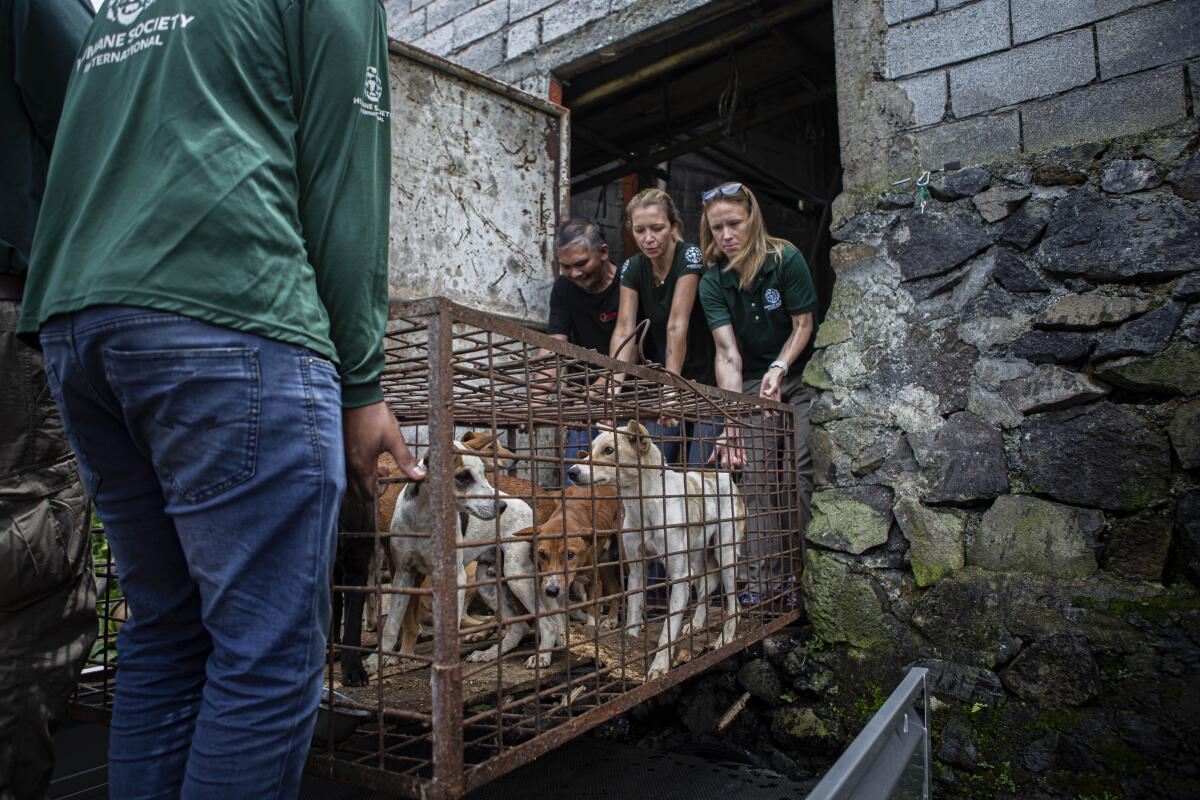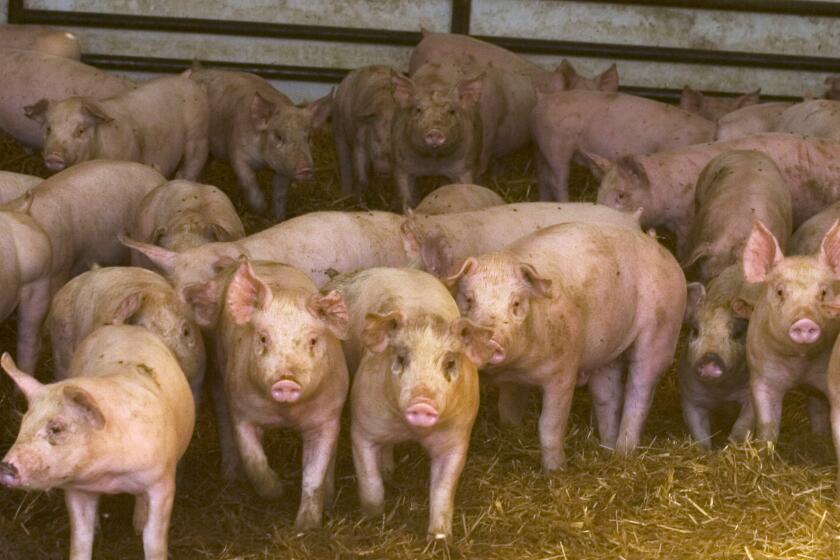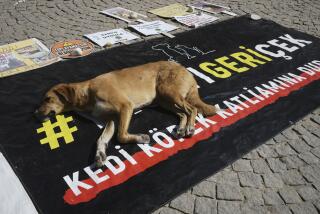Indonesian animal market has ended its brutal dog and cat meat trade, campaigners say

- Share via
TOMOHON, Indonesia — Authorities on Friday announced the end of the “brutally cruel” dog and cat meat slaughter at a notorious animal market on the Indonesian island of Sulawesi following a years-long campaign by local activists and world celebrities.
The Tomohon Extreme Market will become the first such market in Indonesia to go dog and cat meat-free, according to the anti-animal cruelty group Humane Society International, or HSI. Images of dogs and cats being bludgeoned and blow-torched, sometimes while still alive, had sparked outrage.
The permanent end of the slaughter and trade was announced Friday by the regional secretary of the city of Tomohon, Edwin Roring. HSI said they will be rescuing the remaining live dogs and cats from the slaughterhouse suppliers and taking them to sanctuaries.
“We hope that Tomohon will be totally free from dog and cat meat trades,” Roring said in his remarks. “We believe the way to reduce people’s interest in consuming dog and cat meat in Tomohon is to stop selling it in markets.”
He urged people to consume animal food sources that are more hygienic and do not cause rabies, such as pork, beef and chicken. He vowed to deploy law enforcement officers in the markets to ensure there were no more dog and cat meat sellers in the city.
The Tomohon Extreme Market had previously been touted as a tourist attraction and listed on TripAdvisor as a destination that also sells cat meat and the carcasses of wild and protected species such as bats, snakes and other reptiles.
HSI and Indonesian groups operating under the banner of Dog Meat Free Indonesia are campaigning to end the trade in live dogs for human consumption as rabies could spread to humans during the slaughter or contact with infected meat.
Activist Marc Ching, whose work won support from Joaquin Phoenix, Matt Damon and other celebrities, denies paying butchers in Asia to harm dogs.
Videos shot by the campaigners at two markets in North Sulawesi province in 2018 showed dogs cowering in cages as workers pulled the howling animals out and bludgeoned their heads with wooden batons. Often still moving, the animals are then blasted with blowtorches to remove their hair in preparation for butchering and sale.
The welfare groups called the treatment of the animals at the markets “brutally cruel” and like “walking through hell,” generating sympathy among Indonesians and around the world.
International actors and celebrities in 2018 appealed to President Joko Widodo to close the markets, saying if Indonesia joined other Asian nations that have already banned the trade, it would be “celebrated globally” and end a stain on the country’s reputation.
Actress Cameron Diaz, talk show host Ellen DeGeneres, talent spotter Simon Cowell, comedian Ricky Gervais, Indonesian pop singer Anggun and musician Moby are among the more than 90 celebrities listed in the letter.
“These animals, many of them stolen pets, are subjected to crude and brutal methods of capture, transport and slaughter, and the immense suffering and fear they must endure is heartbreaking and absolutely shocking,” the letter said, prompting Indonesia’s central government to issue a regulation saying that dog meat is not food and thus local administrations should act to ban the trade.
North Sulawesi province is home to more than 2.6 million people, who are mainly Christian in the mostly Muslim archipelago nation. Eating dog and cat meat with special spices is a hereditary tradition for most people in the province that has been very difficult to get rid of, said Frank Delano, a local animal welfare activist.
Supreme Court rules California’s restrictions on the confinement of farm animals do not violate the Constitution’s interstate commerce provisions.
Thousands of dogs and cats are slaughtered weekly in North Sulawesi, according to the anti-animal cruelty groups.
“I’m disappointed, but what else can I do? I have to comply with government regulations,” said Melki Pongo, the slaughterhouse owner who has supplied tons of dog and cat meat to the city’s markets for more than 30 years. He said that he will replace them with pork.
Karanganyar district in Central Java became the first to issue a formal ban in 2019, followed by other regions in 2020 and 2021. Most recently, authorities in Indonesia’s capital, Jakarta, announced in March they have banned the dog and cat meat trades. But the dog and cat markets were on Sulawesi.
Indonesia, the world’s most populous Muslim country, might not seem a likely hub of dog meat cuisine as nearly 90% of the country’s 270 million people are followers of Islam, which considers and view dog products as haram, or forbidden, in the same way as pork. Most Muslims won’t touch a dog, much less eat one.
But the archipelagic nation is also home to many other faiths, some of whom consider dog meat a traditional delicacy or believe it has health properties. As much as 7% of Indonesians eat dog, according to Dog Meat Free Indonesia, mostly in North Sulawesi, North Sumatra and East Nusa Tenggara provinces that have a majority of the population identifying as Christian.
About 30 million dogs were killed each year in China, South Korea and many other Asian countries, said Lola Webber, the HSI’s Director of Campaign to End Dog Meat.
Many countries and territories across Asia — such as the Philippines, Taiwan, Singapore, Hong Kong, Thailand and Malaysia—have already banned the dog meat trade and consumption of dogs, according to the HSI.
More to Read
Sign up for Essential California
The most important California stories and recommendations in your inbox every morning.
You may occasionally receive promotional content from the Los Angeles Times.











